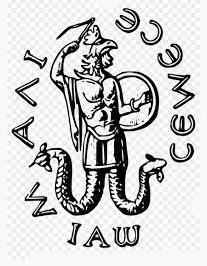1): Believer in a mystical religious doctrine of spiritual knowledge, Applied to various early Christian sects that claimed direct personal knowledge beyond the Gospel or the Church hierarchy;
2): (adj.) "relating to knowledge," especially mystical or esoteric knowledge of spiritual things,
______________________________________________________
Gnosticism lives mainly in or on the edges of Christianity and Judaism and it bears a number of philosophical, astrological, and magical marks loosely belonging in the Near Eastern and Inner Mediterranean areas.
Common to many Gnostic texts and systems are an emphasis on dualistic speculations (e.g., light vs. darkness, good vs. evil, the earthly realm vs. the heavenly world, or the Lightworld); a re-evaluation of many biblical traditions (especially Genesis and the New Testament) so that the Old Testament God, for instance, becomes an inferior figure ignorant of Lightworld entities above and prior to himself; and a keen interest in the salvation of the human soul, which, due to its Lightworld origin, is opposed to the body it inhabits and possesses a superior knowledge.

A gnostic symbol
In brief, Gnosticism exemplifies the common religious and creative response of Late Antiquity to a feeling of alienation toward bodily, material, even social existence, and a burning interest in arriving at a higher, more authentic level of life. Far from leading to paralytic pessimism, this orientation caused Gnostics to create mythologies, ideologies, rituals, and organized communities.
Subversive Gnostic interpretations, especially of the biblical traditions, elicited horrified, swift denunciations from the early fathers of the church, who rightly perceived the Gnostics as a menace to the budding Christian orthodoxy. Much of what we know about Gnostic doctrines and practices comes from these church fathers, but their accounts are unavoidably colored by a strong hostility toward Gnostics.
Direct Gnostic testimonies are available from numerous sources: the Nag Hammadi texts (a cache of fifty-odd documents unearthed in Egypt in 1945); manuscripts found or bought by European scholars in recent centuries; and voluminous texts from two Gnostic groups--the Manichaeans (whose system became a "world religion" stretching from North Africa to China) and the Mandaeans (a still-extant community of Gnostics in Iran and Iraq).
Various Gnostic texts show strong affinities with Greek philosophy, Syriac Christianity, and Iranian traditions.
Gnostic speculations tend to pose a "prehistory" to the creation accounts in Genesis, imagining a number of Lightworld angelic (aeonic) beings emanating or springing from one or more original, ineffable entities. A progression of male and female emanations eventually result in the lowest levels of aeons where the Old Testament God belongs. Ignorant of--or rebelling against--his more elevated predecessors, this god (sometimes called Samael, "the blind one") creates the visible, material world, the human body (an androgynous Adam or the pair Adam and Eve), and imprisons the human soul in it.
Having thus separated the supreme god from the creator god, Gnostics give a negative evaluation of the latter and his minions. In parallel, heroic figures in the Bible turn into villains and vice versa, so that the serpent in paradise and Cain become principles of the light and of gnosis, while Noah turns into a collaborator with the ignorant creator. Gnostic ideas about Jesus tend toward splitting his personality, with Christ, the Lightworld aspect of Jesus, escaping crucifixion, while the bodily Jesus, a mere shadow of his real self, is destroyed on the cross.
The principle of evil originates within the Lightworld itself, results unavoidably from the emanation process, or exists as a separate, anti-Lightworld entity from the beginning of creation. Personified (or hypostasized) evil is in many Gnostic myths portrayed as a tragic figure: he (it is usually male) knows of his wrongdoing and ignorance but seems unable to act differently, though he still hopes for his own, final redemption and return to home in the upper worlds. His mother, personified Wisdom or Error, is likewise tragic, but possesses more insight than her son.
Human responsibilities include knowledge about the good and evil principles, the numerous aeonic beings populating the spheres between earth and Lightworld, and a firm sense of cosmic geography so that the ascending soul may know its way home. Anthropological models often correspond to cosmic maps: the upper human component is the spirit, the mid-level is the soul, and the material body roughly correlates with the macrocosm.
Gnostic religions undoubtedly possessed a rich cultic life alongside the mythological/speculative component, but except for Manichaeism and Mandaeism--and a few scattered texts from other, less delineated traditions--we have only hazy evidence of the intricacies of Gnostic rituals. Initiations, baptisms, sacred meals, rituals for the dead, and techniques for ecstatic experiences are attested in various traditions.
Community ethics, class divisions based on levels of gnosis, and aggressively polemical interests against "normative" Christianity and Judaism testify to organized Gnostic schools and groups eager to define themselves against outsiders and against one another.